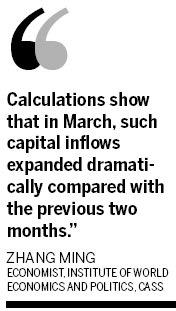Expert warns on hot money
A Chinese Academy of Social Sciences (CASS) economist on Monday warned against drastic increase in short-term speculative capital inflows, especially in the coming months while the country's foreign exchange regulator vowed to strengthen controls of cross-border capital movement.
"Calculations show that in March, such capital inflows expanded dramatically compared with the previous two months," Zhang Ming, an economist at the Institute of World Economics and Politics at CASS, told China Daily. "It could be a new trend."
The State Administration of Foreign Exchange (SAFE) said on Monday that China may see increased inflows of speculative foreign capital this year as expectations of yuan appreciation rise and due to its relatively high interest rate.
"The relatively higher domestic interest rate and moderately rising expectations of yuan appreciation will lead to the scaling up of cross-border carry trade," SAFE said in a report on its international balance of payments.
Zhang said that unexplainable capital inflows into China in the first three months amounted to $5.6 billion, $5.7 billion and $20.5 billion respectively.
The calculation was conducted through subtracting the country's monthly foreign exchange reserves by its trade surplus, foreign direct investment, valuation effects caused by currency exchange rate changes and investment returns, which is believed to be a quite comprehensive methodology.
The eurozone's decision to bail out Greece could anchor the euro and reverse the dollar's appreciation against it, Zhang said, which would lead to more capital moving out of the United States and flowing into emerging economies.
The US, meanwhile, could possibly postpone any interest rate hike until the fourth quarter of this year at earliest, which means the gap between Chinese and US interest rates would not narrow and international capital could continue to flow into countries such as China to profit from it, he said.
"In the coming six months, short-term international capital may continue to flow into China, which would put more sterilization pressure on the central bank and push up domestic consumer goods and real estate prices," he said.
SAFE said it would further improve supervision of irregular cross-border capital flows and build a comprehensive early warning frameworks to resolve such risks.
It also said it expected the current account surplus this year as a percentage of GDP to continue to drop.
SAFE revised the 2009 current account surplus to $297.1 billion from the $284.1 billion figure released earlier this year, while the capital and financial account surplus was also revised up to $144.8 billion from $109.1 billion.
 0
0 






